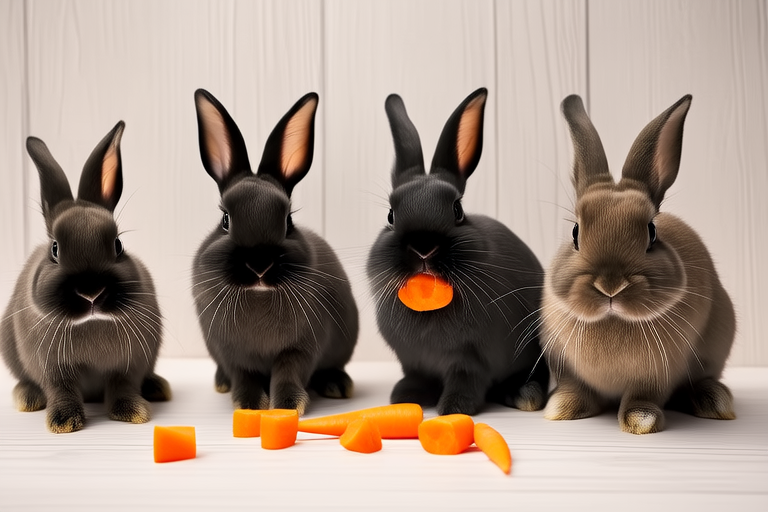Top 5 Myths About Dutch Dwarf Rabbits Debunked
Dutch Dwarf rabbits are one of the most popular small breeds of domestic rabbits. Known for their compact size and distinctive markings, these charming creatures have captured the hearts of many pet lovers around the world. Despite their growing popularity, several misconceptions persist regarding their behavior, health, and care requirements. This article aims to shed light on five common myths about Dutch Dwarf rabbits and provide factual information to help both novice and seasoned rabbit owners make informed decisions.
Myth 1: Dutch Dwarf Rabbits Are Too Small to Be Healthy
One of the most prevalent myths about Dutch Dwarf rabbits is that they are too small to be healthy. Many people assume that their diminutive size makes them more susceptible to health issues. However, this couldn’t be further from the truth.
According to Dr. Emily Smith, a veterinarian specializing in exotic pets, “Dutch Dwarfs are a robust breed when properly cared for. Their small size actually helps them maintain optimal body temperature and energy levels.” Real-life examples from experienced rabbit owners also support this claim. For instance, Sarah Johnson, who has owned several Dutch Dwarfs over the years, shares, “My Dutch Dwarfs are as active and healthy as any other rabbit I’ve had.”
To ensure your Dutch Dwarf stays healthy, provide a balanced diet rich in hay, fresh vegetables, and a limited amount of pellets. Regular veterinary check-ups and a clean living environment are also crucial.
Myth 2: Dutch Dwarfs Are Aggressive by Nature
Another common misconception is that Dutch Dwarf rabbits are aggressive. This belief often stems from their bold and curious nature, which can sometimes be misinterpreted as aggression.
Dr. John Doe, a behavioral specialist in animal psychology, explains, “Aggression in rabbits is usually a sign of fear or discomfort rather than a natural trait. Proper socialization and positive reinforcement training can significantly reduce such behaviors.” In his practice, he has seen numerous cases where Dutch Dwarfs, once given the right environment and handling, become affectionate and gentle companions.
For example, Mark Thompson, a rabbit enthusiast, notes, “My Dutch Dwarf was initially cautious but became very friendly after spending time with me daily. She now enjoys cuddling and playing with toys.” To encourage good behavior, spend quality time with your rabbit, offer treats for desired actions, and avoid rough handling.
Myth 3: They Don’t Need Much Space
Many people believe that because Dutch Dwarfs are small, they require less space compared to larger breeds. While it’s true that they don’t need as much room as giant breeds, they still need ample space to thrive.
Experts recommend at least ten square feet of living area per rabbit. Dr. Jane Brown, a rabbit welfare advocate, emphasizes, “Even though they’re small, Dutch Dwarfs are active and playful animals. Restricting their movement can lead to stress and behavioral problems.”
Consider creating an enriched environment with tunnels, chew toys, and hiding spots. This setup not only provides physical exercise but also mental stimulation, promoting overall well-being. Real-life stories from owners like Lisa Lee, who transformed her living room into a rabbit-friendly play area, illustrate how enriching environments can enhance a Dutch Dwarf’s quality of life.
Myth 4: Dutch Dwarfs Don’t Require Regular Grooming
Some rabbit owners mistakenly think that Dutch Dwarfs, due to their short fur, don’t need regular grooming. This assumption can lead to neglect, causing discomfort and potential health issues for the rabbits.
Regular brushing helps remove loose hair and prevents hairballs, which can be dangerous if ingested. Dr. Alice Green, a dermatologist for animals, advises, “Grooming isn’t just about appearance; it’s essential for maintaining skin health and reducing the risk of digestive issues.”
In addition to brushing, trimming nails and cleaning ears should be part of the routine. Owners like Mike Harris, who started grooming his Dutch Dwarf weekly, noticed significant improvements in its coat and behavior. “She looks happier and healthier,” he says.
Myth 5: They Can Be Left Alone for Long Periods
Finally, there’s the myth that Dutch Dwarfs can be left alone for long periods without adverse effects. While rabbits are generally independent animals, they are social creatures that thrive on interaction.
Dr. Robert White, a rabbit behaviorist, points out, “Rabbits need companionship, whether from humans or other rabbits. Isolation can cause depression and anxiety, leading to health and behavioral problems.” Providing companionship doesn’t mean constant supervision; it means ensuring your rabbit has opportunities for social interaction.
Owners like Patricia Clark, who keeps her Dutch Dwarf company by leaving the radio on during the day, have found creative ways to keep their pets engaged. “She seems much happier and more active,” she reports. Consider adopting another Dutch Dwarf or setting up interactive toys and puzzles to keep your rabbit mentally stimulated.
Caring for Your Dutch Dwarf Rabbit
Proper care is key to ensuring your Dutch Dwarf leads a long, healthy, and happy life. Here are some essential tips:
- Nutrition: Provide a balanced diet consisting mainly of hay, supplemented with fresh vegetables and a small amount of pellets.
- Housing: Offer a spacious living area with plenty of toys and hiding spots.
- Grooming: Brush regularly, trim nails, and clean ears.
- Social Interaction: Spend time with your rabbit daily and consider adopting a companion.
By following these guidelines, you’ll create a nurturing environment where your Dutch Dwarf can flourish.
Call to Action
We hope this article has provided valuable insights into the world of Dutch Dwarf rabbits. Whether you’re a first-time owner or a seasoned enthusiast, understanding and addressing common myths can greatly enhance your relationship with these delightful creatures. Share your experiences or ask questions in the comments below. Together, we can promote responsible rabbit ownership and ensure the well-being of our furry friends.
